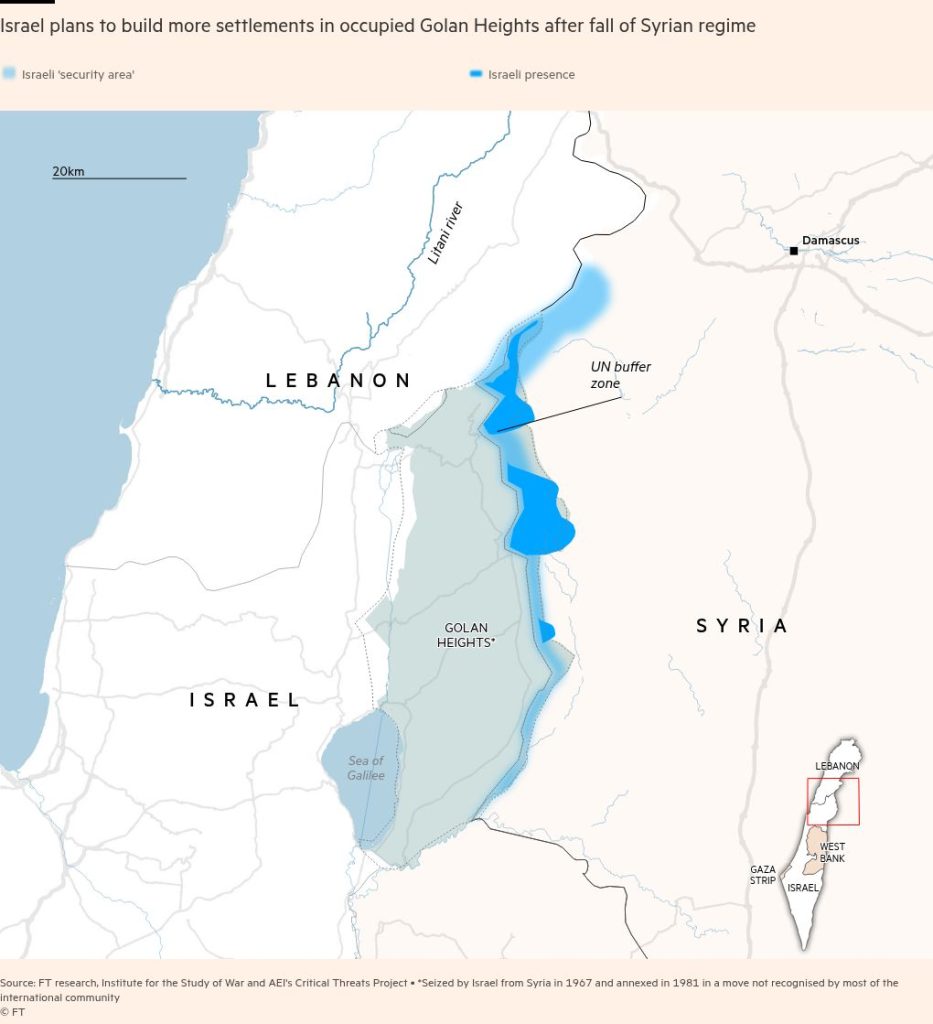Germany condemns Israel plan to double population in Golan Heights

Unlock the Editor’s Digest for free
Roula Khalaf, Editor of the FT, selects her favourite stories in this weekly newsletter.
Benjamin Netanyahu’s plan to double the Israeli population in the occupied Golan Heights has drawn international condemnation, with Germany urging its ally to abandon the move and Turkey accusing Israel of attempting to “expand its borders through occupation”.
The Israeli prime minister’s office said on Sunday that the government would allocate Shk40mn ($11mn) to “encourage demographic growth” in Israeli settlements in the Golan Heights, which are located on territory seized from Syria in 1967 and considered illegal under international law.
Netanyahu said the move was necessary “in light of the war and the new front” in Syria, which had opened after an Islamist-led alliance swept away Bashar al-Assad’s regime a week ago.
But Germany on Monday called on Israel to “abandon” the plan.
In an unusually forthright statement from a country that sees support for Israel as an important part of its atonement for its Nazi past, a foreign ministry spokesman said “it is perfectly clear under international law that this area controlled by Israel belongs to Syria and that Israel is therefore an occupying power”.
Meanwhile, Turkey’s foreign ministry denounced the move as “a new stage in Israel’s goal of expanding its borders through occupation” and warned that it would “further increase tensions in the region”.
Saudi Arabia, Qatar and the United Arab Emirates have also condemned the plan, with Saudi Arabia accusing Israel of “sabotaging . . . Syria’s prospects for restoring its security and prosperity”, and the UAE — one of only a handful of Arab states that recognises Israel — calling the move “a deliberate effort to expand the occupation”.
Israel seized the Golan Heights from Syria in the 1967 Arab-Israeli war and then annexed the land in 1981.
US president-elect Donald Trump endorsed Israel’s claim to sovereignty over the area in 2019, one of several steps during his first administration that were supportive of Israel. But most of the international community has not recognised the move.
Israeli settlements in the Golan Heights are home to about 24,000 people, while a similar number of Druze — an ethnically Arab minority spread across Syria, Lebanon, Jordan and Israel — also live there.
Netanyahu’s plan to double the Israeli population in the Golan Heights is one of a number of steps that Israel has taken since the collapse of the Assad regime that have caused outrage across the Middle East.
Over the past week, Israel has carried out a massive bombing campaign that has destroyed most of Syria’s naval, aerial and missile capabilities, as well as sending ground forces into and beyond a previously demilitarised buffer zone that was established in a 1974 armistice.
Netanyahu said on Sunday that Israel had “no interest” in a confrontation with Syria’s new leaders and that he had ordered the steps to “thwart potential threats from Syria” and to prevent militants taking control of areas near the border.
A person familiar with the situation said the plan to double the population of Israeli settlements in the Golan Heights was a “political” move designed to show “commitment” to the area, rather than a military or strategic move.
“It’s not huge money,” the person said. “At the moment everyone is criticising Israel for its moves [in Syria]. This is how Netanyahu traditionally responds.”
Abu Mohammad al-Jolani, head of Syria’s leading rebel faction Hayat Tahrir al-Sham, said on Sunday that his forces were not seeking new conflicts despite Israel’s actions, and must not get distracted from rebuilding Syria. But he condemned Israel’s justifications for its air strikes as “flimsy” pretexts.
Additional reporting by Laura Pitel in Berlin
#Germany #condemns #Israel #plan #double #population #Golan #Heights








